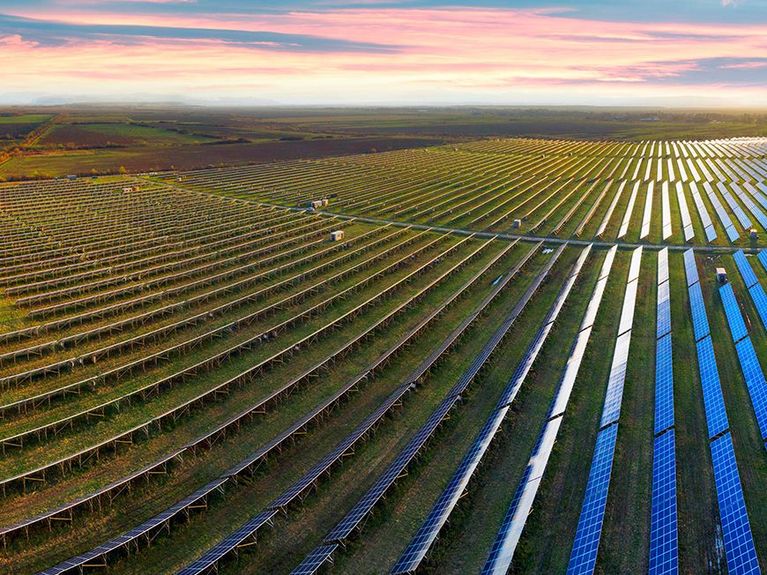Interview
“Research and development in times of war: not only possible, but crucial!”

Field with solar panels in Ukraine. Picture: Roman Mikhailiuk/Shutterstock
On the occasion of the Ukraine Recovery Conference, representatives from Helmholtz, Fraunhofer and Leibniz will discuss how research can contribute to the sustainable reconstruction of Ukraine. We spoke to Bernd Rech, Scientific Director of the Helmholtz-Zentrum Berlin, about existing cooperation projects and where help is needed most.
How can research contribute to Ukraine’s reconstruction?
It can contribute a lot. The EU has included Ukraine in its research area and the country is part of the European research program Horizon Europe. Germany and Ukraine have filled the agreement on scientific cooperation, which has been in place for 30 years, with new content and will ceremonially sign it in Kyiv in October. It includes four so-called clusters of excellence between partner institutions in Ukraine and Germany. We believe that there is a need for more such clusters, where cooperation should be particularly intensified – especially in the area of energy system analysis and the electricity system, in the area of resilient local energy solutions and in education. Ukraine is a very open and innovative country with a very long research tradition. European experts repeatedly praise the fact that the transmission system operator, Ukrenergo, manages to maintain the power supply.
What are the most promising areas of research collaboration in the current situation?
For sad reasons, of course, cooperation that addresses the immediate future, immediate needs is of paramount importance. Let’s take the example of electricity: in Ukraine, electricity has to be switched off in large areas again and again, and blackouts are always to be expected. Decentralized as well as regional solutions are needed. This is exactly where Helmholtz comes in, together with other partners from Germany and abroad. Research in the field of energy and climate can make a decisive contribution to improving the security of supply in Ukraine. We at Helmholtz-Zentrum Berlin are strong in the fields of solar, batteries, hydrogen and system solutions and are therefore a good partner. One example of such cooperation is the “Green Deal Ukraina” project.
What is this project about?
“Green Deal Ukraina” started in 2023 and is funded by the German Federal Ministry of Education and Research. The project is about research and development in the field of energy and climate research with Ukraine. Together with our Ukrainian and Polish partners and governments, we are working on energy system modeling and studies. We are also training local, regional and national Ukrainian decision makers on energy solutions.
Bernd Rech is Scientific Director of the Helmholtz-Zentrum Berlin (HZB) for Materials and Energy. Picture: HZB/David Ausserhofer
What are you currently working on at “Green Deal Ukraina”?
In July, our capacity building team will travel to Ivano-Frankivsk and begin training local energy experts. This will focus directly on local solutions. In particular, our team is currently working on how to secure Ukraine's energy supply for next winter and the years to come. Green Deal Ukraine is at the forefront of the Ukraine Recovery Conference currently taking place. Together with Fraunhofer and Leibniz, we are organizing a major event on research and development for sustainable reconstruction in the fields of energy, climate and agriculture. The Federal Minister of Education and Research, Bettina Stark-Watzinger, and her Ukrainian counterpart will also speak at the event. The media are also interested in the topic. Der Spiegel, for example, published a high-profile interview on the status of the project.
What are your medium- and long-term plans?
Ukraine is expected to be invited to formal accession negotiations at the next European Council (June 27-28, 2024). This is very important and has symbolic significance for the country’s membership in “Europe”. The “Green Deal Ukraina” team is working closely with the EU Commission and with German and Ukrainian government agencies on legal issues. By 2027, we want to establish an independent energy and climate think tank in Ukraine to continue and expand the work that is being done here in Berlin from 2023 to 2027.
What can we learn from Ukraine in this kind of cooperation?
First of all, we are learning that we belong together: Ukraine is European, and there is great potential here in a very exciting country. We are learning that research and development in times of war are not only possible, but crucial. And we are happy to be part of this dynamic.
Readers comments